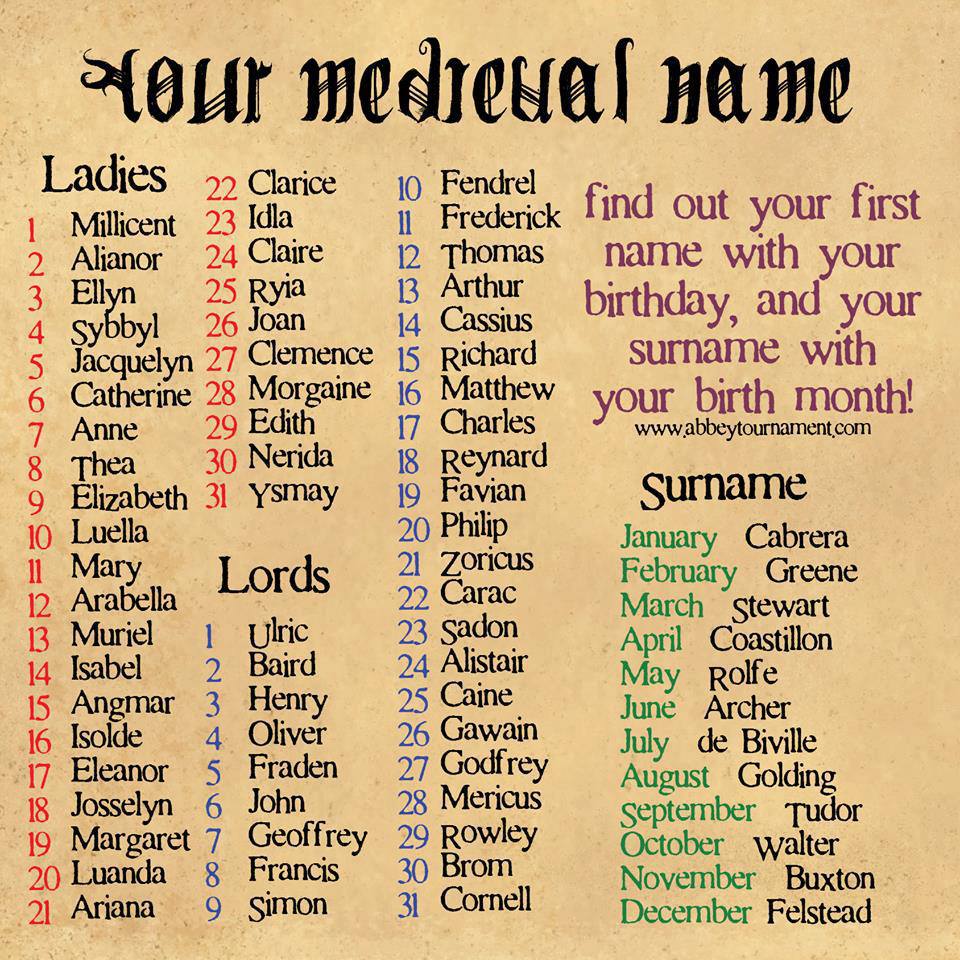Exploring The Enigma Of Medieval Names
Medieval names carry with them a sense of history and mystery, evoking images of knights in shining armor, wise kings, and enchanting queens. These names were not merely labels; they often held significant meanings and were tied to the cultural, social, and religious beliefs of the time. As we delve into the world of medieval names, we will uncover the stories behind them, the reasons for their popularity, and how they reflect the values and traditions of the medieval era.
During the medieval period, which spanned from the 5th to the late 15th century, names were often derived from various sources, including old Germanic, Latin, and Celtic origins. Many medieval names were inspired by the virtues, professions, or characteristics that parents hoped their children would embody. Furthermore, the use of surnames began to emerge during this time, adding another layer of complexity to the naming conventions of the period. Understanding these practices allows us to appreciate the rich tapestry of history woven into each name.
As we navigate through the fascinating realm of medieval names, we will explore not only their etymology but also their connections to notable historical figures and their impact on contemporary naming trends. Whether you are a history enthusiast, a writer seeking inspiration, or someone interested in the tales that names can tell, this exploration promises to be both informative and captivating.
What are the Origins of Medieval Names?
Medieval names originated from a variety of sources, reflecting the diverse cultures that existed during the period. The names could be derived from:
- Old Germanic roots: Many names were influenced by the Germanic tribes that settled in Europe, often incorporating elements that signified strength and bravery.
- Latin influences: As Christianity spread, Latin became a dominant language, leading to the adoption of names from saints and biblical figures.
- Celtic heritage: In regions like Britain and Ireland, Celtic names flourished, often embodying the natural world or heroic legends.
- Occupational names: Many surnames were derived from the professions of individuals, such as Baker, Smith, or Fisher.
What Were Some Popular Medieval Names?
Throughout the medieval period, certain names gained widespread popularity. Here are some notable examples:
- William: A name of Germanic origin meaning “resolute protector.”
- Elizabeth: Of Hebrew origin, meaning “God is my oath,” popularized by Queen Elizabeth I.
- Richard: Meaning “powerful ruler,” it was borne by several English kings.
- Margaret: A name meaning “pearl,” often associated with purity.
How Did Social Status Influence Medieval Names?
Social status played a significant role in the naming conventions of the medieval era. Nobility often had more elaborate and unique names, sometimes incorporating titles or regions, while commoners typically had simpler names. The distinction was crucial, as it reflected one's place within the social hierarchy. Additionally, names were often linked to family lineage, with sons carrying their father’s name as a mark of honor and continuity.
Who Were Some Notable Figures with Medieval Names?
Throughout history, many figures with medieval names have left a lasting legacy. Here are a few notable examples:
| Name | Title/Role | Notable Achievements |
|---|---|---|
| Richard the Lionheart | King of England | Led the Third Crusade |
| Joan of Arc | Military Leader | Heroine of France |
| William the Conqueror | Duke of Normandy | Conquered England in 1066 |
| Elisabeth I | Queen of England | Golden Age of England |
How Have Medieval Names Influenced Modern Naming Trends?
The legacy of medieval names continues to shape modern naming practices. Many individuals today still draw inspiration from medieval names when choosing names for their children. The revival of interest in historical and vintage names has led to a resurgence of medieval names in contemporary society. Some examples include:
- Arthur: A name that evokes the legendary King Arthur and the Knights of the Round Table.
- Matilda: A name associated with strength and battle.
- Beatrice: Meaning “bringer of joy,” it has a timeless charm.
What Role Did Religion Play in Medieval Naming Conventions?
Religion significantly influenced naming practices during the medieval period. Many names were derived from biblical figures or saints, reflecting the deeply ingrained Christian beliefs of the society. Names like Mary, Joseph, and Anna were commonly used, as they were associated with revered figures in Christianity. Additionally, the practice of naming children after saints was believed to provide protection and blessings.
How Can You Choose a Medieval Name for Your Child?
If you are considering choosing a medieval name for your child, there are several factors to keep in mind:
- Meaning: Research the meaning behind the name to ensure it aligns with your values.
- Pronunciation: Consider how easy it is to pronounce and spell.
- Uniqueness: Look for names that stand out but are not overly complicated.
- Historical Significance: Consider names that have a rich history or connection to your heritage.
What Resources Are Available for Exploring Medieval Names?
There are numerous resources available for those interested in exploring medieval names further:
- Books: Historical name dictionaries and genealogical books can provide insights into medieval names.
- Online Databases: Websites dedicated to name etymology can offer detailed information.
- Historical Societies: Joining local historical societies can provide access to expert knowledge and resources.
In conclusion, medieval names are more than just identifiers; they are a gateway into the past, reflecting the culture, beliefs, and history of the medieval era. Whether you are fascinated by the stories they tell or seeking inspiration for a modern name, the exploration of medieval names offers a rich and rewarding journey.
Article Recommendations
- Elon Musk Wife 2024
- Mark Harmon Health
- Nfl Minimum Salary
- Angelina Jolie Sad News
- Alice Cooper
- Pat Sajak Presidential Endorsement
- John Nettles
- Martha Borg Age
- John Nettles Today
- Funny Fantasy Basketball League Names




